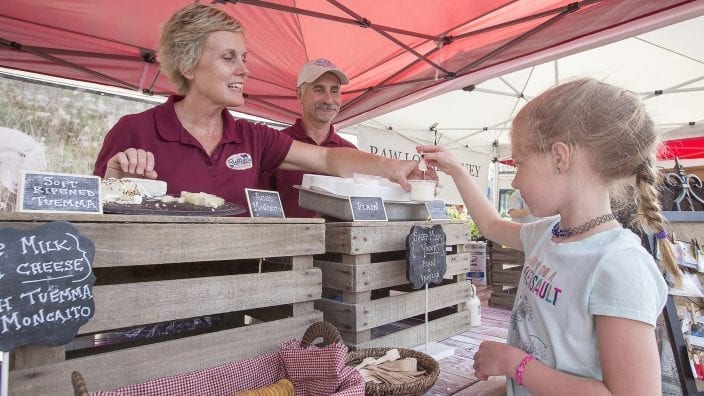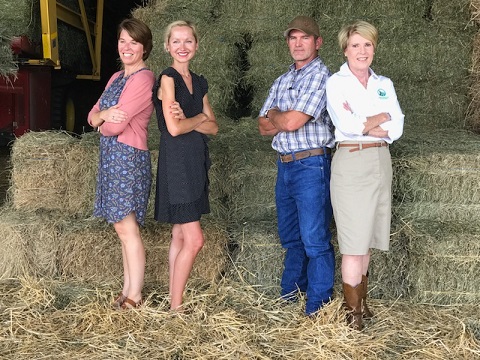Farmer’s Guide to Trucking Regulations available to Ohio Farm Bureau members
The guide includes a farm driver checklist, overview of state and federal regulations and exemptions, CDL qualifications and more.
Read More
From the field: Farmers and mental health
An interview with Nathan Brown
By Ivory Harlow, Oct. 29, 2019
The Ohio Department of Agriculture, the Ohio Department Mental Health & Addiction Services, Ohio Farm Bureau and partners recently launched the #gotyourback campaign to address farm stress and mental health concerns in rural communities.
Farmer and Ohio Farm Bureau State Trustee Nathan Brown wants his fellow farmers to know he’s got your back. Organization Director Ivory Harlow visited his farm in Brown County to discuss farm stress and how we can help farmers and their families during tough times.
Ivory: The #gotyourback campaign ignited a meaningful conversation about mental health challenges for farmers and their families. Why is farm stress a hot topic now?
Nathan: Farmers are facing difficult times in agriculture. Commodity prices have been on a steady decline. Farm income peaked in 2012 and has decreased ever since. Operating costs are higher today than they have been in recent years. Farmers work a lot of hours alone. Even when working in a crew, like during harvest, there is little interaction with others. All of these things contribute to the stress Ohio farmers are feeling right now.
Mental health is something that very few farmers want to talk about, but every farmer struggles with stress at some point. The agricultural industry needs to stick together and support one another. The #gotyourback campaign is an effort to let farmers know they are not alone and offer resources to cope with stress and mental health challenges.
Ivory: Are there specific sectors of agricultural industry that you see struggling more than others?
Nathan: Stress affects all farmers, all ages, farms of all types and sizes. Dairy farmers have been hit particularly hard, but the trade war is taking a toll on grain, corn and soybean operators. Beef, pork and poultry producers are struggling too. Uncertainty in the market is a main driver of stress because there is no way to plan for profitability.
Ivory: Farmers are a stoic group. Many believe silence is a sign of strength. How can we get the message out that seeking help is not a sign of weakness?
Nathan: We’ve got to break through the stigma that seeking help for mental health is any different than seeking help for a physical condition. Farmers don’t hesitate to seek care from a health professional for an injury or a cold; the same should be true for mental health concerns.
The good news is that #gotyourback campaign and other like it are boosting awareness that taking care of your mental health is as important as your physical health.
Soci al media is helping spread the word. Farmers are using social media to share their stories, find support and connect online. The message is clear: Let’s get out and let’s talk about it — If you’re suffering from farm stress, I’ve got your back.
al media is helping spread the word. Farmers are using social media to share their stories, find support and connect online. The message is clear: Let’s get out and let’s talk about it — If you’re suffering from farm stress, I’ve got your back.
BEHAVIORAL SIGNS
PHYSICAL SIGNS
Ivory: If farmers or family members recognize symptoms of stress in themselves or others what can they do?
Nathan: Be willing to check on your neighbors and friends. If someone is showing symptoms of stress stop in and check on them. It can be as easy as asking “Are you doing alright?” Let him/her know they aren’t alone. I’ve traveled around the state and talked to a lot of farmers dealing with stress. Once you get the conversation started, it’s amazing how much better everyone feels talking about it.
Farmers and their families can reach out to a mental health provider. There is at least one in every community. If you need help locating a mental health professional, make an appointment with your general health practitioner. He or she can point you in the right direction.
Visit the Ohio Department of Agriculture #gotyourback resource page.
24/7 free, confidential crisis lines: Hotline Text “4hope” to 741741 or call 1-800-273-8255.
YOURSELF
SOMEONE YOU KNOW
Ivory: Many farmers have minimum health insurance coverage or no coverage. Clergy, federally qualified health centers, university and mental health practitioner training centers offer counseling services at low or no cost. Visit 211.org to locate social services near you.
Picture: Lori Criss, Director, Ohio Department of Mental Health & Addiction Services; Ivory Harlow, organization director, Ohio Farm Bureau; Kipp Harlow, farmer, Ross County; Dorothy Pelanda, director, Ohio Department of Agriculture


The guide includes a farm driver checklist, overview of state and federal regulations and exemptions, CDL qualifications and more.
Read More


The emergency fuel waiver to allow the sale of summer gasoline blends containing 15% ethanol will lengthen the period during which Americans can continue buying E15 from June 1 to Sept. 15.
Read More

The Small-Scale Food Business Guide covers federal and state regulations for selling food products such as raw meat, dairy, eggs, baked goods, cottage foods, fruits and vegetables, honey and more.
Read More

New resources and technology are broadening the different types of sales tools and strategies available to farmers.
Read More

ODA will enroll 500,000 acres into the program for a two-week sign-up period, beginning April 22, 2024, through May 6, 2024. Contact local SWCD offices to apply.
Read More

Katie Share of Columbus has been named ExploreAg and Youth Development Specialist for Ohio Farm Bureau.
Read More

Mary Klopfenstein of Delphos has been named Young Ag Professional and Ag Literacy Program Specialist for Ohio Farm Bureau.
Read More

The plan has been updated to give sole proprietors access to more rate stability and a smart solution that offers potential savings on health care.
Read More

The American Farm Bureau Federation, in partnership with Farm Credit, is seeking entrepreneurs to apply online by June 15 for the 2025 Farm Bureau Ag Innovation Challenge.
Read More

Adele Flynn of Wellington has been elected treasurer of the Ohio Farm Bureau Federation and now holds the third highest elected office in Ohio’s largest and most influential farm organization.
Read More